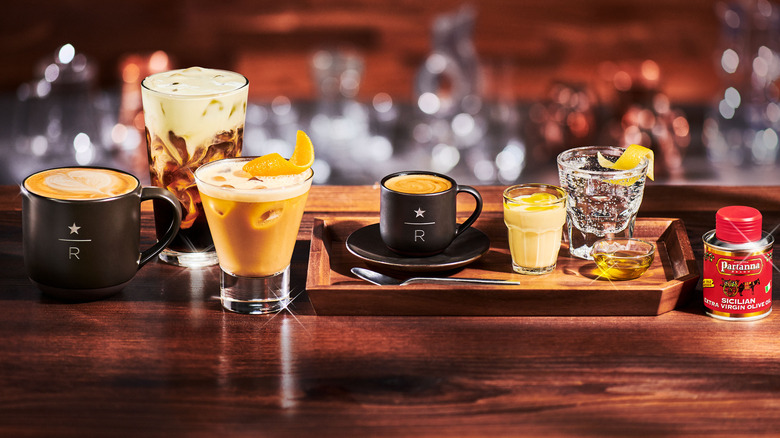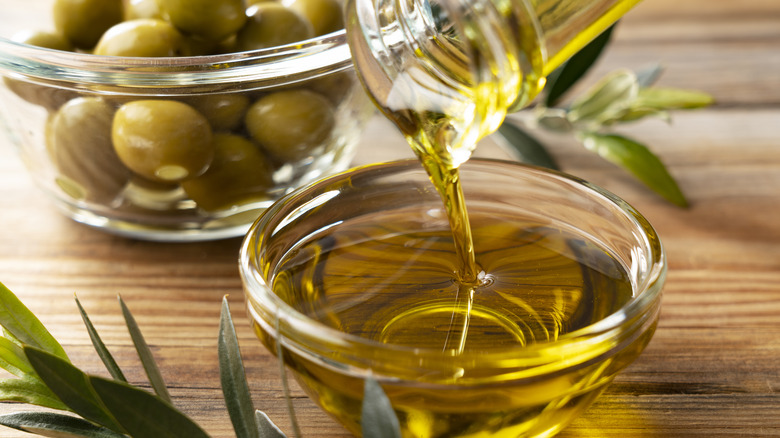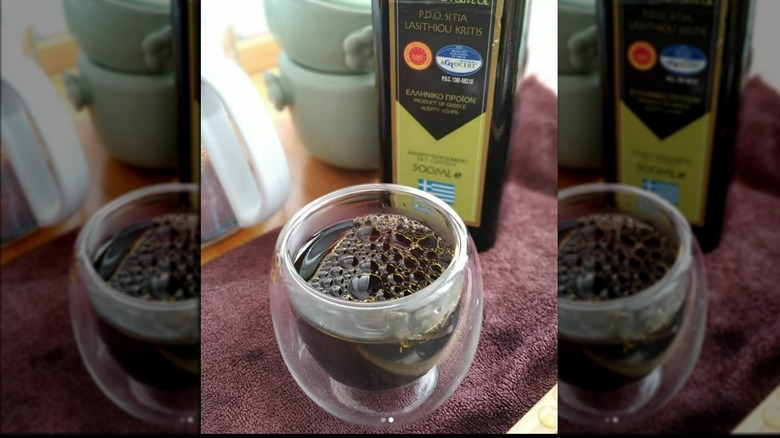Does The Olive Oil Coffee Trend Deserve Its Hype? Experts Weigh In
Starbucks has been instrumental in evolving the American notion of coffee from basic to extravagantly customized, especially after founder and interim CEO Howard Schultz became involved in the early 1980s. Schultz recently shared on Starbucks Stories & News that it's not since winter 1983 that he's had to feel so much "on the precipice of such incredible transformation" as he does now amid the debut of Starbucks' new olive-oil-infused coffees.
Launched on February 22, 2023, in Italy, Starbucks' Oleato line of coffees is due to arrive in Southern California this spring, with launches in Japan, the Middle East, and the U.K. to follow. Although the initial platform includes as many as eight beverages, they all share one thing. Each is infused with cold-pressed extra virgin olive oil – just a spoonful but enough to deliver a "unique alchemy," Schultz's letter promises.
What Schultz doesn't say outright is that this new line stands poised to change how the world drinks its coffee. Certainly, olive oil coffee is trending as we speak. The question is, does the olive oil coffee trend really have legs? And does it deserve the hype it's been receiving? Tasting Table posed these questions to top experts in the coffee, olive oil, and cooking industries. Here's what we found out.
Adding olive oil to coffee isn't as novel as it sounds
People seem excited to try olive oil-infused coffee, according to anecdotal research conducted by Peter Hyde, Executive Chef at Catania Oils. Among the chefs and customers of various high-end Cape Cod eateries whom Hyde polled, "the consensus was that it's definitely a trend" and certainly one worth trying at least once.
Matthew Woodburn-Simmonds, the coffee expert behind Home Coffee Expert, pointed out to Tasting Table that adding olive oil to coffee isn't actually much of a departure from adding egg to coffee, or butter, or even milk and creamer. "Adding fat to coffee reduces the bitterness," Woodburn-Simmonds explained.
Hyde notes that olive oil coffee's main draw may be its texture — this tracks with Starbucks' description of the Oleato line as "velvety" in texture. But Hyde isn't convinced that olive oil coffee will uniformly taste "buttery" or "delicately sweet and lush." To wit, when Hyde stirred a Catania olive oil into his coffee, he noted a subtle spiciness. He explains that "an oil with high antioxidants [such as olive]" would tend to lend "a spicy aspect to the experience."
Does adding olive oil to coffee boost its nutritional profile?
As Hyde mentioned, olive oil is loaded with antioxidants, which offer nutritional benefits. So, what does that mean in terms of the nutritional benefits of olive oil in coffee? According to certified nutritional chef and nutrition and wellness counselor Melissa Eboli, not too much.
"One of the few benefits of adding olive oil to your AM coffee would be for satiation," Eboli advised Tasting Table. What she means is that if you drink your coffee straight black, you'll probably be eating soon after. By contrast, adding olive oil to your morning brew may help suppress your appetite if you're trying to fast.
But outside of delivering that extra boost of satiety, Eboli doesn't see how a spoonful of oil is going to offer "direct nutritional benefits." If anything, the chef expressed concern about the size of one's spoonful and the potential for adding too much. "I suggest only to add a teaspoon per every 6-ounce cup of Joe," as opposed to a tablespoon. On the other hand, Woodburn-Simmonds notes that olive oil does serve as a viable vegan alternative to commercial non-dairy creamers.
Add a teaspoon of olive oil to your coffee
If you're curious about the olive oil coffee trend, you don't have to wait to find it in Starbucks or the inevitable throng of coffee houses that may jump on the oil coffee bandwagon. Woodburn-Simmonds suggests just stirring a teaspoon of olive oil right into your cup like you would any creamer or milk. Indeed, adding a teaspoon of EVOO might offer a way to more thoroughly enjoy your cheaper and more bitter grinds of coffee, giving them a sweeter taste without the addition of sugar.
What Woodburn-Simmonds does not advise is adding olive oil to the coffee beverages that go beyond black that you may typically order at coffee shops — think those carefully calibrated coffee cocktails or a flavored latte of sorts. Doing so runs the risk of upending the flavor balance and ruining a great coffee beverage already unique and enjoyable. He likens it to the fact that just like you shouldn't put ketchup on wagyu beef, you wouldn't "add olive oil to really high-quality coffee."
If you want to take your concoction a step further and you're not averse to varying tastes, then Eboli recommends mixing in coconut or oat creamer for fuller flavor and mouthfeel.



